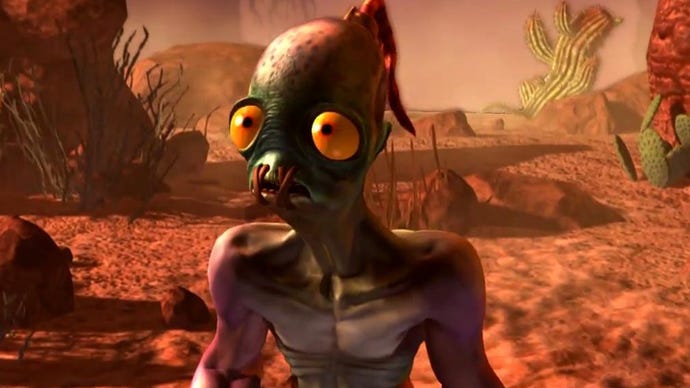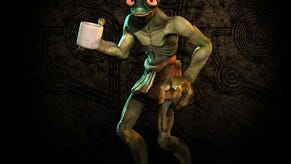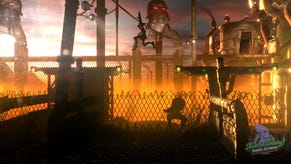Don't be scared of developing for consoles, says Oddworld dev
"The biggest thing is that the PS4 and Xbox One are basically PCs" - and the barriers continue to come down, says JAW's Stewart Gilray
Stewart Gilray has been making video games for over 26 years. As head of Just Add Water, the past five years have seen his work published on PC, PSP, Vita, PS3 and PlayStation 4. The studio's latest release, Oddworld: New n Tasty, boasts a Metacritic ranking of 83, including a perfect score from The Escapist and 9s from the likes of Eurogamer and Nowgamer.
And yet it's easy to forget that this is a studio in its prime. JAW isn't part of the "cool" indie dev scene, nor is it a top-tier triple-A console behemoth. This is 16 people in a small part of the north of England called Otley, "the arse end of nowhere", according to Gilray.
But it punches well above its weight when it comes to quality game releases.
"I think people are a little shocked when they see New n Tasty, but why wouldn't we create something like that?" he says.
"The look of the game wasn't your average fare for a small team. Maybe people saw the quality of the visuals and expected a team of 20 artists but in reality we've got 4 environment artists and 2 doing character animations."
"With New n Tasty the reviews have been pretty bloody spectacular across the board. That's shown people what us as a team are capable of doing. I also think it shows that we're triple-A indie and not traditional indie."
By "traditional" Gilray means those developing games with a more leftfield vibe, a mix of vanity project, social statement and esoteric design - or at least something striving to be considered more than just a game.
"Even though we're a small studio and 'indie' we see it as being indie-funded rather than arthouse development. We're not going to do things like Fez, we're aiming to be as triple-A as best we can for 16 people."
What's also interesting about JAW is that it's a studio that has stuck to the console market even through lean times. While others ran off to a perceived goldrush creating games for iOS and Android, Gilray's experience helped him see only pennies in the profits, and the carnage that happens when a market is flooded with too many games.
"I went through that thing before," he says. "When the PS2 popped up I was running a small team of three. Developers couldn't afford to go from PSone to PS2 because it was just such a massive leap. We did the sidestep to GBA. But in 2002 the whole GBA market became saturated with developers who couldn't afford to go to PS2.
"Everybody started going pop, pop, pop."
"The biggest thing is that the PS4 and Xbox One are basically PCs. With the closed architecture it's not as difficult to develop for PS4 as it was for the PS2."
The business deal with partners on console isn't necessarily different, according to Gilray, but the margins are thankfully higher.
"We've got more chance of making it on console because it's not saturated and it's a 70/30 business split. With consoles you can charge £15, £20 for a title. But on iOS as soon as you go over £3 it's seen as expensive."
According to Gilray, consoles are just getting easier to work with. "The biggest thing is that the PS4 and Xbox One are basically PCs," he says.
"With the closed architecture, like you have in a Mac to some degree, it's not as difficult to develop for PS4 as it was for the PS2.
"PSone was fairly easy to develop for, PS2 was "oh my god" hard, PS3 wasn't as hard as PS2 and then, again, the PS4 isn't as hard to develop for as the PS3."
"We've been saying to Sony for years now 'make it an easier system to work with'. And the first inclination of that was PS Vita. You just plug it in and it works. Then PS4 came along and it's almost plug-and-play to some degree. That's startling for somebody who's been in development for 26 years."
Gilray believes that some developers are wary of console development even though both Microsoft and Sony are making their systems as accessible as they can through various indie and business initiatives.
"There's a stigma attached to console. 'We can't develop for console, it's one of the big three'. Thanks to Shahid Ahmad at Sony and others' help it's opened it up for PC developers to try console development. It's not actually that hard. It's the same, almost. It's fixed hardware and with PC you had to cater for AMD, Nvidia, Intel and so many other configurations that the big job is getting it to work on all the hardware rather than working on your actual game."
"With consoles you can charge £15, £20 for a title. But on iOS as soon as you go over £3 it's seen as expensive."
"It's weird because some people think 'Sony? They wouldn't talk to us', he continues. "Of course they would. All these games that you wouldn't expect to see on a PlayStation are coming out - The Witness, Everybody's Gone to the Rapture - they're suddenly turning up. Sony recognises these games as being good and they are giving everybody an opportunity to get on the system.
"Sony treats everybody who wants to publish exactly the same, whether that's Ubisoft or Jeff Minter or FuturLab."
Or Just Add Water. The studio has two projects that it's moving forward with at the moment, although Gilray won't discuss them: "I can't mention anything about them without being shot". We know at least that one is for PS4 and the other is a multiformat console title.
Until then there's work to finish on the PS3, PC, Vita and Mac versions of New n Tasty. Maybe those versions will score just as highly as the PS4 release and Just Add Water will get a bigger name for itself, lifting it out of perceived obscurity and pleasing Gilray as much as any high score ever could.
"Sometimes it's good to be known as a company rather than just a product," he concludes.








